Key Components for the Future of Work: Skills, Culture, Communication
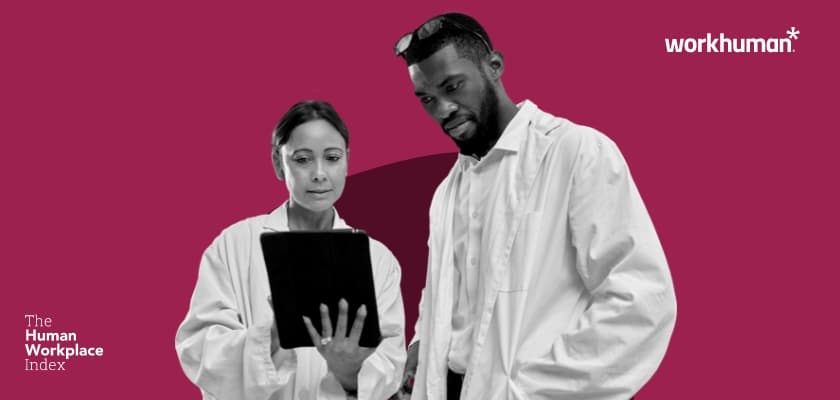
Insights from the Global Human Workplace Index, Q1 2024
In today's dynamic workplace landscape, navigating skills gaps, fostering a positive culture, and enhancing communication and connection are paramount for organizational success. As employees strive for career advancement and personal growth, the role of companies in providing opportunities for upskilling and professional development becomes increasingly crucial.
Just as crucial is the need to cultivate a supportive and inclusive workplace culture, where recognition and appreciation are valued. A foundation of recognition, combined with effective communication and feedback mechanisms, can create transparency, better collaboration, and ultimately, lead to a better employee experience within organizations.
In the Human Workplace Index for the first quarter of 2024, we surveyed 3,000 full-time workers in the U.S., UK, and Ireland to see what challenges and opportunities they see surrounding skills development, workplace culture, and communication dynamics in various regions. Here’s what they said.
Navigating Skills Gaps and Professional Development in Today's Workforce
With technology, especially AI reshaping industries and job roles, the need for upskilling and professional development has never been more apparent, marking a significant shift in future of work trends. Knowing which organizational skills are important for professional success is crucial in this rapidly evolving landscape.
A significant portion of the survey respondents feel competent in their current roles and feel ready to take on new challenges. Over three-fourths of respondents expressed confidence in possessing the knowledge and skills required for their present positions, while nearly 80% believe they are equipped for the next phase of their careers.
Employees aren’t just focusing on their own skillsets, however. A global trend revealed that skills gaps aren’t just concerning for those at the top levels of organizations—they are becoming apparent within teams. For example, in the UK, 63% of respondents reported they worked with folks whose skillsets do not align with their current role. In the US, this number rose to 64%, while in Ireland the figure reached 70%. One quarter of Irish respondents also found themselves hindered at work due to their under-skilled colleagues, while others noted they were taking on an increased workload to pick up the slack.
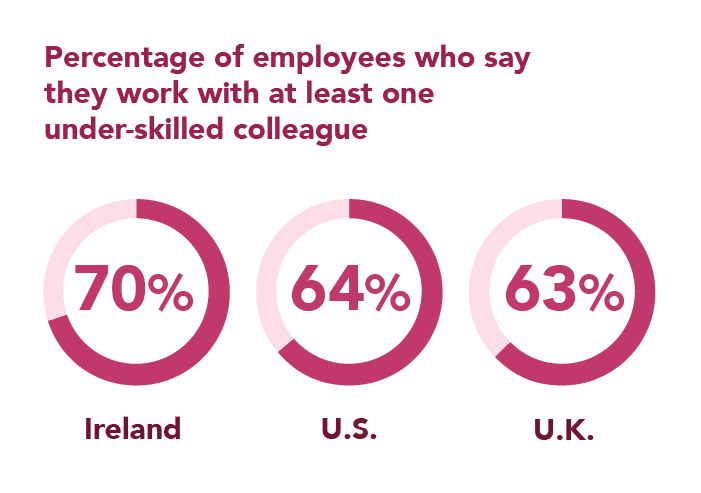
These productivity challenges were mirrored across the board as a significant portion (33% in the US and UK) feel slowed down at work due to the need to provide extensive support to their colleagues. However, the data also revealed that workers are anything but complacent: in fact, a staggering 86% of those surveyed are actively seeking to learn new skills. The motivations behind this pursuit vary, with many aiming for career advancement, higher pay, or improved job performance. However, a sizable portion of individuals, around 19% of the total sample, are preparing for a complete career change, reflecting the dynamic nature of today's employment landscape.
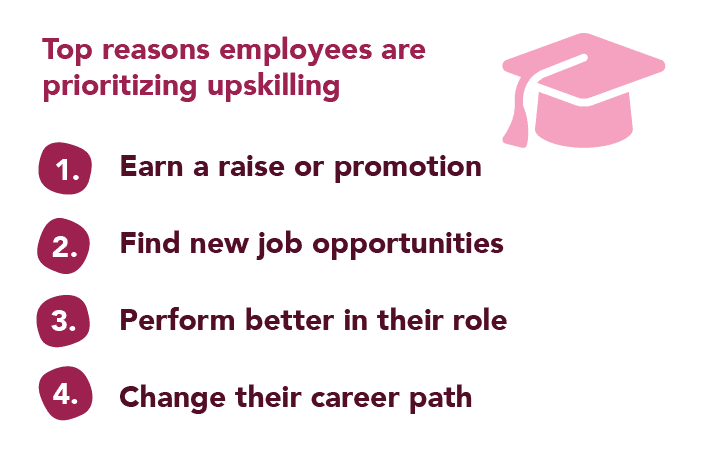
As job openings decline and competition intensifies, the importance of continuous learning becomes increasingly evident. This trend aligns with the findings of our Q4 US survey in 2023, which identified learning new skills as a top method workers planned to use to improve their wellbeing at work. Fortunately, many companies recognize the significance of upskilling initiatives. A significant majority of respondents (86%) report that their organizations offer upskilling programs, with the majority (79%) finding them valuable and helpful.
While formalized L&D programs are necessary to ensure workforces receive the training and upskilling that businesses demand, it is not the only place employees turn for professional development. Managers play an important role when it comes to driving employee development within organizations. While there is an abundance of resources available in and outside of an organization, over one third of respondents said they turn to their managers as their primary source of guidance rather than online resources or external career coaches.
This reliance underscores the evolving nature of management, with supervisors increasingly fulfilling mentorship roles. Employees seek managers who not only facilitate their success in their current roles but also demonstrate a personal investment in their professional growth.
The influence of managers extends beyond skills development to interpersonal dynamics. A substantial portion of workers (41%) also look to their managers for guidance on communication and collaboration, highlighting the importance of strong leadership in fostering a supportive work environment. Indeed, feeling supported by one's manager ranks among the top factors contributing to a sense of belonging in the workplace.
Nurturing a Positive Workplace Culture: Recognizing Drivers and Addressing Challenges
In the fabric of a thriving workplace culture, recognition emerges as a crucial thread. While 82% of respondents believe their companies are making effort in fostering a positive work environment, only about 60% of those respondents agree these efforts are successful, emphasizing the need for companies to not only create programs that help build culture, but continuously examine their impact.
Alarmingly, 17% of respondents express that their organizations aren't even making efforts in this regard, highlighting a critical area for improvement. Addressing employees' social needs emerges as a potent strategy to bridge this gap, with "being appreciated and recognized for contributions" emerging as the most important factor in creating a positive workplace culture, according to 39% of respondents.
In Ireland, 79% of respondents reported their organization is perceived to be fostering a supportive work style and positive work culture; however, nearly a third (29%) feel these efforts are falling short. And though 72% of Irish employees say their organization has defined company values, the responses reveal a distinct disconnect between the employer’s intentions and employee experience, with 30% of survey respondents believing these values do not align with the day-to-day culture.
This discrepancy highlights that it is not enough for employers to set company values at the highest level and leave it at that. To bridge the gap between those stated values and the reality of the workplace, leaders need to invest in initiatives and programs that bring those values to life, such as a formalized peer-to-peer recognition program.
The significance of recognition becomes even more pronounced when considering its absence in toxic workplace environments. One in 3 respondents in the US said a lack of recognition or appreciation for one's work ranks as the most significant factor contributing to toxicity. This underscores the vital role that gratitude plays in fostering a healthy work atmosphere and combating negative dynamics.
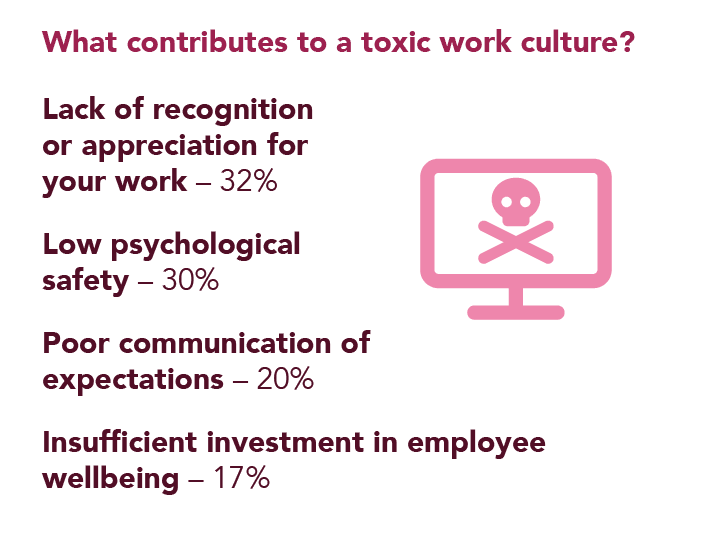
Recognition stands out as a cornerstone of a positive company culture and ranks fifth in the key elements that make employees feel as though they belong at work. A lack of recognition can have serious ramifications for employees and perpetuate the notion that employees need to hide parts of themselves when they come to work. 43% of global respondents admitted to feeling the need to change their personality to better fit in at their company.
Culture is the determining factor for whether this pattern perpetuates or is finally interrupted. Setting company values is one way that organizations try to build culture. While most respondents said that their companies have defined values, a significant portion feel a dissonance between these values and everyday workplace culture. For those experiencing this disconnect, a concerning 42% indicate that their leaders are unaware of the disparity, emphasizing the need for greater leadership awareness and alignment.
Navigating company culture can be challenging due to the prevalence of unwritten rules, with over 60% of workers encountering these norms in their workplaces. This underscores the importance of transparent communication and clear expectations to enhance the employee experience and mitigate misunderstandings.
Fostering Connection and Communication: Enhancing Workplace Dynamics
As organizations look for more ways to connect employees in person, accessibility emerges as a key determinant of employee participation according to the survey respondents. While coworker attendance and networking opportunities drive attendance, logistical factors such as timing and convenience play pivotal roles in the decision to attend.
The prevalence of after-hours events and conflicting schedules underscores the need for organizations to prioritize inclusivity and accommodate diverse preferences. Moreover, a significant portion of respondents cited disinterest in workplace social events, signaling a disconnect between traditional event formats and employees' preferences.
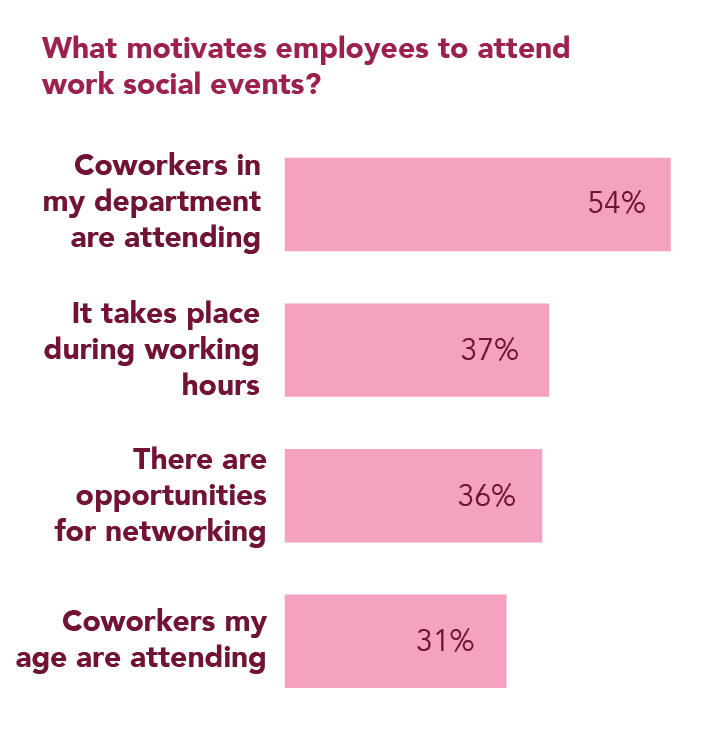
To address this gap, organizations must prioritize understanding the social dynamics among employees and tailor events to align with their interests and comfort levels. From trading happy hours for wellness outings to offering remote-friendly options, there's a need for innovative approaches that foster genuine connections and cater to diverse preferences. By creating inclusive and engaging social experiences, companies can cultivate a sense of belonging and strengthen interpersonal relationships within the workplace.
Effective communication serves as the cornerstone of a healthy organizational culture, facilitating transparency, collaboration, and feedback. While a majority of respondents (58%) feel their companies respond well to feedback, there's a clear demand for more open and diverse channels of communication. That is especially true in Ireland where opinions diverge more apparently. Just 49% of Irish respondents feel their companies respond well to feedback, significantly below the global average. Irish respondents reported that allowing for anonymous feedback, having more open conversations with employees, and conducting more frequent pulse surveys were ways companies could improve the feedback experience.
The desire for more open conversations was also reflected globally. When employees can share their perspectives and their feedback is acted on in the organization, it communicates that they are valued and that the company cares about how their employees feel at work.
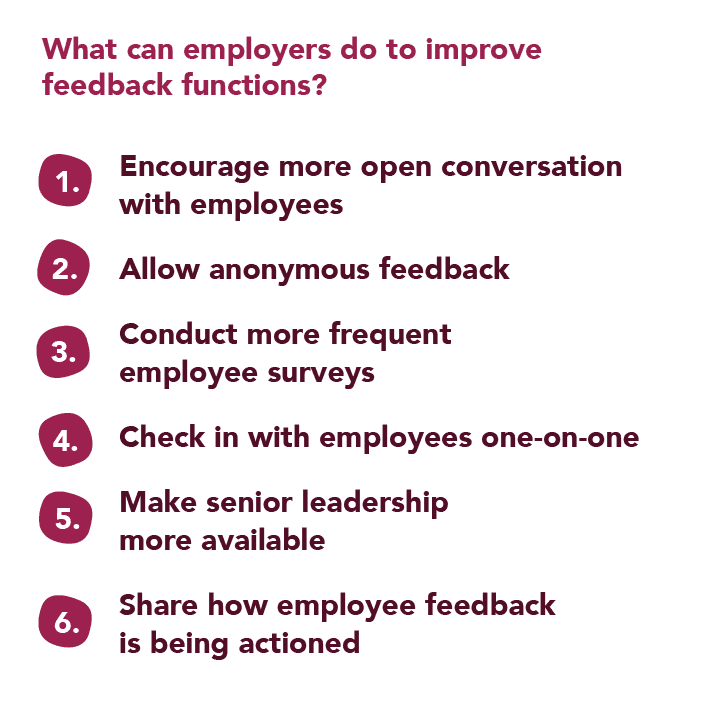
Respondents also expressed a desire for greater alignment between company policies and feedback received from employees. However, the prevalence of negative feedback delivered through workplace communication channels suggests a potential barrier to open dialogue.
The relationship between recognition, inclusion, and openness in the workplace is undeniable. Employees are more likely to share personal accomplishments and interests if they feel recognized and valued for their contributions. This highlights the significance of acknowledging the whole individual beyond their productive output, fostering a culture of appreciation and support.
By prioritizing recognition and inclusivity, organizations can create environments where employees feel comfortable sharing their authentic selves, ultimately enhancing collaboration, morale, and overall workplace satisfaction.